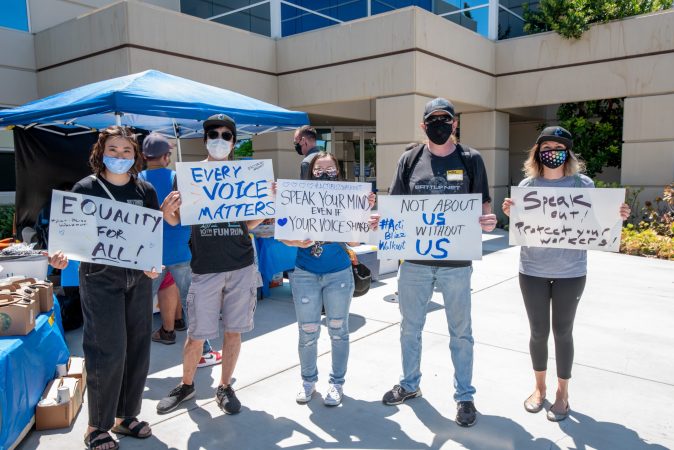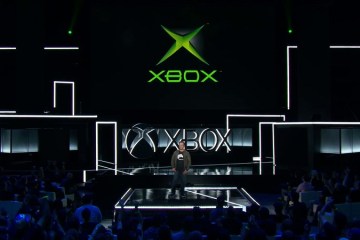Over the last several weeks the stature of Activision-Blizzard has come into question with the recent lawsuit delivered by the State of California. From this, a multitude of voices spoke out about the terrible abuse workers suffered while present. From that moment, poor, yet official, statements from high-ranking individuals were given in the form of weak apologies.
The news doesn’t stop. In fact, it continues to dominate the headlines any chance it gets. From the pictures of various Blizzard staff posing with a picture of Bill Cosby, to the predicable departure of J. Allen Brack, news just kept on circulating. Walk-outs occurred, people announced their refusal to cover Activision-Blizzard’s games, and people called for a boycott of all their titles. I have said before, there is nothing more fragile on this planet than a gamer boycott, and I continue to stand by those words. We have seen it happen with Call of Duty amongst the plethora of Ubisoft titles, but like many things in this world, there are a handful of nuances pertaining to it.
On a moral standpoint, a boycott seems like an obvious, reasonable stance to take. I even called for it. Others have argued that boycotts are not the right approach to this situation, and to an extent they are right. Jumping to the boycott solution is often a knee-jerk reaction, one of which I am guilty of propagating myself. As I said, there is a ton of nuance and emotion, and I think it deserves to be discussed.
Pro-Boycott
Being pro-boycott tends to come from a strictly moral standpoint. For most people, calling for one is due to good intentions, yet might not be well thought out. Incredibly awful things have happened, and the reaction to it will always be to support the people it happened to, and to hold the company accountable. By not buying into the game company’s titles, you are sending a message of “I don’t approve of your practices, so I will not buy your game.” The hopes would be that the company would see a loss in sales, and it would force their hand to make changes that customers approve of.
In its own merit, that is a rather good stance to take. It has been proven to be effective in the past when it came to a wide range of other industries including the car and home appliance areas. Companies have learned valuable lessons when it came to how customers react to various implementations of their products. As we have seen, just the mere mention of a boycott amongst all the news affected Activision-Blizzard’s stock pricing with a drop as low as $20 per share. This drop has caused Bobby Kotick, Activision’s CEO, to finally come up and say something about the situation and issue his own statement.

Once Kotick made his official statement (one of many), stock prices recovered a small bit. Can we draw the line and say that the drop caused the changes? One could argue that direct causation isn’t applicable, but we can only look at these events with a keen eye and determine for ourselves the truth: change happens when money is taken away.
Another reason to boycott is understanding where your money is going. When you buy a game, the money exchanges a lot of hands. Buying a game from GameStop doesn’t do anything for companies like Activision-Blizzard unless the company runs out of copies, which would then force them to purchase more from another distributor or Activision-Blizzard themselves. When you purchase something directly from an online store, they make more profit. We have seen this with third party companies where online sales increase and so does profit margin. Even more-so when we look at World of Warcraft and their shop, where the money goes directly to the company and cuts out the middleman.
I mentioned all of that because Activision-Blizzard happened to hire a law firm, WilmerHale, best known for busting unionization efforts at Amazon. Which means by making purchases of content released by Activision-Blizzard, you are actively supporting their ability to shut the conversation down entirely as well as spread more fear, uncertainty, and doubt through an industry that desperately needs unionization. Lawyers are expensive, and I doubt that the shareholders are paying out of their pockets for them. Not buying products seems like the clear-cut solution to end this problem, but it could equally cause damage as well.

Anti-Boycott
On the other side of the fence, it is very easy to not support a boycott. It could be due to a variety of reasons, from enjoying the games that a company makes, to believing that change can happen. A big notion is that by purchasing games, you support the development staff directly, and in a way, you are right. Although that opens the conundrum of if I don’t buy a game because I don’t like it then I am partially responsible if the company goes under. It is a ridiculous sentiment, but I am attempting to scour this nuance with a Brillo pad here. This is critical thinking after all.
When a title becomes popular and ends up making a large profit, the more likely that company is to make more of it. The only reason why we continue to have World of Warcraft expansions is because it repeatedly brings in enough money to validate the game’s existence. In theory, the first game does well, and the second iteration gets a bigger budget because the scope needs to be bigger, which means more staff might be needed to meet various targets and deadlines, some of which can only be attainable with additional staff and resources. An incredibly profitable title doesn’t just stop. Bobby Kotick will never wake up and announce, “No more Call of Duty. We have enough.”

If a game isn’t successful, we don’t get those sequels. We have heard it time and time again from developers all across the industry, that if you wish to support a studio, then buy the game when it comes out. We have heard this from Jeff Ross, director of Days Gone, when he said they were turned down from making a sequel due to poor profits (allegedly).
Buying these games creates more games, as the proof is in the pudding. The speed in which they are released is a whole other story, but we don’t need to tread that far to find additional examples. Smaller niche titles rarely get sequels or support beyond a certain point where the fanbase drops off unless it hits critical levels of success such as titles like Among Us which didn’t gain its massive popularity until almost two years after initial launch. When a game begins to sour, so do the employees that worked on it. The people who make your games love doing it and by ignoring their titles, you happen to dismiss their work, the very thing they put love and effort into.
Capitalism has changed the way we do business as well as reward employees. Activision-Blizzard uses something called profit-sharing, which a lot of other companies must incentivize good work and rewards employees with bonuses in accordance with performance metrics. If a company or game does very well in sales and reception, in theory that employee who has been working hard could earn a significant bonus, which plenty of employees rely on. In this sense, you should support the games, and buy them because not only are employees at Activision-Blizzard underpaid in comparison to other studios, but it could be incredibly hard for them to progress to higher positions.
The Catch-22
Before the news broke about the terrible work environments over at Activision-Blizzard, there were problems. The World of Warcraft community was (and still is) up in arms about the direction of the game (though that’s another article for another time). Fans were sick and tired of the systems within the game, the direction in which the story was going, and the continuously repeated game mechanics involving borrowed power that ultimately didn’t make players feel great about playing, amongst other aspects. World of Warcraft requires a monthly subscription fee of $15 a month, which makes players feel entitled to having their criticisms heard, and they are not wrong about that. Once the story of the rampant sexual abuse came to light, it was the final nail in the coffin for a lot of players out there. Every single piece of news after that was just an extra nail to ensure the lid of the metaphorical coffin was as secure as a Bobby Kotick’s bonuses.
By unsubscribing from the game, players were directly sending a message to Blizzard saying World of Warcraft needs to change. Now that there is a more dire situation, that message has been combined with the concept of solidarity for the development staff. World of Warcraft was already approaching a player drop-off with Warcraft-centric influencers and streamers leaving the game for Final Fantasy 14, which is currently suffering from its own success.

Currently, there are no major Blizzard games out in the wild that need our immediate attention. So, if you want to support the Blizzard team, the only way to realistically do so at this current moment would be to subscribe to World of Warcraft, buy loot-boxes in Overwatch, buy Call of Duty coins, or create a new Battle.net account and rebuy games you already own. We also forget the fact that this is Activision-Blizzard, and when they were doing very well financially, they still laid-off a ton of employees, so even re-buying stuff might not be enough.
Also, by purchasing their games you pump money into a company that is attempting to silence their employees, and you can see where this is going, right? Boycott or not, this is an endless cycle of capitalistic torture that will never actually solve the core issue at hand. We can’t tell people who make their livelihood off Activision-Blizzard’s games to just jump ship because getting a new job takes a ton of time, effort, and is an anxiety-driven experience. Plus, from what we have seen, the people who have been ousted from various companies can possibly get a job somewhere else restarting the abuse cycle assuming they learned nothing.
The solution doesn’t rest in where you spend or don’t spend your money. Currently, the recently announced installation of a new co-leadership team consisting of Jen Oneal and Mike “YaBoy” Ybarra (I made up that nickname, let’s hope it sticks). Jen Oneal hails from her previous position as Studio Head at Vicarious Visions, and Mike Ybarra was the Corporate Vice President of Gaming at Microsoft, and happens to be an avid fan of World of Warcraft. Already we are seeing a massive change within the World of Warcraft subreddit that is relatively positive. Current headlines involving the awful news are starting to sink, while a handlebar mustachioed man rests as the top post at the time of writing this.


This change and positive reinforcement we are experiencing is coming from the removal of those who were responsible for the misdeeds that occurred at Activision-Blizzard, but that isn’t everyone. The demands presented by the staff have yet to be fully acknowledged which means change still needs to happen and we cannot lose focus.
Let’s be honest here, do you think people are going to ignore the next Call of Duty when it is revealed? Do you think people won’t play Diablo 2, or Diablo IV, or Diablo Immortal, or Overwatch 2, or the next World of Warcraft expansion? While various outlets are pulling their coverage of these events, it doesn’t solve the core issue. Bickering about how you spend money doesn’t solve the issue. You can still be excited for these games while demanding companies to change for the better, and I think that is what we should be doing, because there is no straight-forward way to solve these problems. If you do not feel okay playing World of Warcraft or any other Activision-Blizzard title, that is fine. If you enjoy playing Call of Duty and Diablo and look forward to the next iterations, that is also fine, this is not a zero-sum game. As we know, only Sith deal in absolutes.
While we enjoy what we enjoy, I can hope that the ferocity of our collective roar doesn’t slowly become background noise simply because we as consumers feel okay with playing Blizzard games again. When the time comes for us to raise our voices in solidarity, I hope that we can do so while being open to options in how to enact better policies. Change doesn’t happen overnight, and in this case, it will be a long process, but it starts from within. The best way to show support for developers is to reflect the positive nature in your own environment, and cultivate a welcoming experience for people of all backgrounds. Speak up, and if you are afraid to, find someone who also believes in what you do. As a wise man in a cave once said, “It’s too dangerous to go alone! Take this.”



Nice article but how do we fix the current situation at hand? If gamers or anyone really cared about the situation, Sony, Microsoft and other platforms could stip selling their games. All Activision and Blizzard are going to get is a slap on their wrist. That’s it. They need to be gutted from the inside from staffing and HR should be third party company.